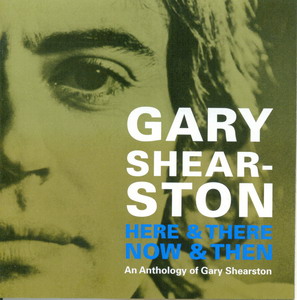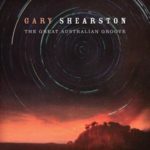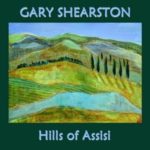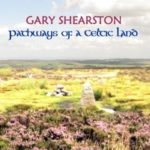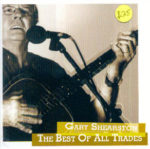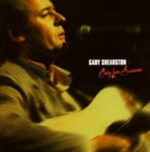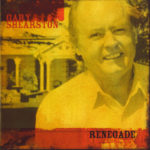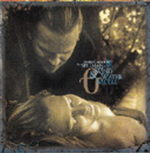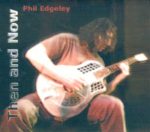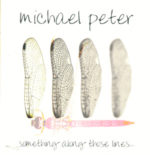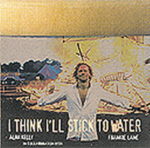Description
Gary Shearston has been a major influence on Australian music for some five decades. In a society where we are conditioned to take music for granted, as yet another dismissible commodity, Gary’s music has stood the biggest test of all – the test of time.
“Gary Shearston is the closest Australia has ever come to producing a local version of Bob Dylan” (Bruce Elder, SMH). Not only was he an influential singer of traditional folk songs during the 1960s heyday of the folk boom & one of the few determined to sing our own songs – about shearers, drovers and other bushmen with a natural bush voice when other Australians were singing with broad Irish accents, sounding like frisky sailors or cotton pickers on the Mississippi, but he was also a hugely gifted songwriter, a radical re-interpreter of the folk tradition (who else thought of using reggae as a backing for Australian songs as early as 1974?) and, if you need any further evidence, had he not been banned from travelling to the United States due to his involvement in the anti-Vietnam movement, he would have ended up being managed by Dylan’s manager, Albert Grossman.
Grossman invited Shearston to go to the States. US Immigration locked him out. So Shearston ended up in London in the early 1970s where, signed to Charisma Records (famous for a catalogue which included Genesis and Van Der Graaf Generator) he scored a hit with an unadorned version of Cole Porter’s ‘I Get a Kick Out of You’.
He eventually moved back to Australia to raise his family and later to commit himself to his beliefs and church. Throughout all these travels, both physical and spiritual, Gary has continued to create new songs and revisit his old ones. He still travels that same road as a singer, songwriter, free thinker and music stylist.
For those who have been living in a parallel universe (or watching CMC); and are inexplicably ignorant of Shearston’s career, a little backtracking may be in order.
Gary Shearston was raised in Tenterfield, NSW. When he was 12 years of age his family moved to Sydney where, after leaving school, he went on to work as a journalist. His childhood experience of life in the bush, however, would develop as one of the dominant influences in his writing.
In the late 1950s, at a time when most Australian Folk Singers were performing their repertoires in unnaturally broad Irish accents; when Rock‘n Roll and Country Singers mimicked a ridiculously ‘Overblown Texan Tone’ and when even many of The Bush Balladeers in Country Music were trying to sound more like ‘The Singing Brakeman’ than Australian Bushmen, Gary pioneered a style that somehow managed to drag the Australian Accent, kicking and screaming, into the light of popular music.
It is no exaggeration to say that without his influence the musical culture which spawned and supported the rise of The Bushwackers, Redgum and John Williamson would probably never have existed.
By 1962 Gary was living in Kings Cross and had fallen under the influence of The Sydney Bush Music Club. He was already performing Australian classics, in between his more accessible material, when the ‘folk boom’ of the early 1960’s hit.
Many people in Folk and Country Music (who regularly sing them now) are often unaware of how close to oblivion, songs such as the Rybuck Shearer and Lachlan Tigers actually came. A great debt is owed to the efforts of archivists and historians such as A.L. Lloyd, Duke Triton, Edgar Waters and Eric Watson, who collected and preserved Australia’s Musical Heritage.
Shearston quickly became a regular performer on TV and in Sydney Clubs, and was invited to open The Troubadour Folk Club at the insistence of Brother John Sellers, the American Bluesman who was performing here at the time.
By the time Gary was signed to CBS, in 1963, his work as a songwriter had also become increasingly recognised. ‘Australian Broadside’, featuring ‘Sydney Town’, cemented his position as one of Australian Music’s leading voices. His classic, ‘Sometime Lovin’’ became a world-wide hit when it was recorded by Peter, Paul and Mary on their LP, ‘Album’, in 1965. Like Bob Dylan, John Denver and Gordon Lightfoot, whose careers were also launched when their work was showcased by that iconic folk trio, Shearston’s star was rising rapidly in the international arena.
But there was another side to Gary Shearston, and it was one which would inevitably lead to both his finest moments and his greatest challenges. Gary, who had been raised a Christian; was a committed activist. In addition, he was a man whose belief in the redemptive power of song led him to begin writing material which openly targeted some of the more contentious Inequalities and injustices of the day.
His stances on Australia’s involvement in the Vietnam War and on Australian Settler Culture’s treatment of our Indigenous people were set to put him in conflict with many of those who, at the time, controlled the Recording and Media Markets. It even led to death threats against him.
One night, at a packed concert at The Sydney Town Hall, Shearston was warned by Police that they had received credible information that there might be an attempt to assassinate him on-stage and, since they could not guarantee his safety, he should cancel his appearance.
Shearston refused to be silenced by such threats of violence. The courage it must have taken to step unprotected into that spotlight; to perform passionately and to speak clearly and uncompromisingly of his beliefs was an enormous inspiration to anyone who witnessed it.
In the wake of PP&M’s cover of his song, Gary travelled to the USA and was invited to record with Warner Bros. But, even as he prepared to leave Australia in 1967 his file was being passed by ASIO to US authorities. Consequently, even despite a ‘Letter of Good Character’ written by Edward Kennedy, he was refused a Greencard. Reactionary forces had, it seemed, conspired to silence him again and Shearston was effectively blacklisted and forbidden to perform; suffering the same fate as The Weavers and many other heroes of The Anti-War Music Movement.
It was a devastating reversal. His career nose-dived.
Shearston’s determination however, was his personal strength. For him, there was always ‘Tomorrow’. In early 1972, he left the USA for England. It was to be here that he would re-ignite his career. In an appropriately ironic twist, and one which exacted more than a little cultural revenge, he skyrocketed to the top of the English Charts in 1974, with a quirky version of Col Porter’s American Classic, “I Get a Kick Out Of You”.
It was delivered in a deadpan and uncompromising Aussie accent; a style that was clearly ‘Broad Aussie’ taking on ‘Broadway’. People loved it!
In time, however, it was to be the resurgence of Gary’s Christian Faith, in the following decade, that would reset the course of his career and lead him back to the country of his birth. During the late 1980’s, while still recording and performing, he felt increasingly drawn to pursue a religious vocation. Shearston was ordained an Anglican minister in July 1992.
Great stories, like great songs, often run in circles. Eventually, after serving congregations in Deniliquin, Hay and Bangalow, Gary returned to his home town of Tenterfield where he and his wife, Karen, purchased the very house in which Gary had lived as a child. Shearston retired from full time Parish Ministry in 2003.
Shearston’s latest offering, which features his son, Luke, on drums has been superbly engineered & mixed by Roger Illott at Restless Studios, in Stanthorpe. It is a new and exciting musical chapter in the life of a man who is rightly acknowledged as an Australian Music Legend. (Pat Drummond, Country Update)
This compilation offers music selected from those five decades to represent Gary’s repertoire, however two compact discs barely does justice to the body of songs recorded by him over these years. Some are taken from his very earliest recordings when he was seen as the most reliable interpreter of Australia’s bush song tradition. This was in the heyday (or should I say Hootenanny days?) of the international folk revival when Australians were singing with broad Irish accents, sounding like frisky sailors or cotton pickers on the Mississippi. Gary was one of the few determined to sing our own songs – about shearers, drovers and other bushmen, and with a natural bush voice. He also started to sing new songs written in the folk idiom, songs that told Australian stories and his collection of contemporary songs, issued as ‘Australian Broadside’ was a landmark album in the history of our music. Always a social activist, Gary also wrote songs the reflected the changing society we lived in. They were good, solid songs that resonated around the country and the world.
He saw trappings of fame: a television series, extended record contracts, big stadium shows etc but he usually saw right through these as simply a part of his other life. He went to Britain and toured to Ireland, the States and elsewhere and made some recordings in England that found their way back to Australia. He eventually moved back to raise his family, and, later, to commit himself to his beliefs and church. Throughout all these travels, both physical and spiritual, Gary continued to create new songs and revisit his old ones. He still travels that same road and this compilation is a tribute to him as a singer, songwriter, free thinker and music stylist.
In the past decade, we’ve been fortunate to have several releases from Gary Shearston. Each is filled with songs that feed the soul, challenge the mind and do the heart all power of good. God bless Gary Shearston. He most certainly has.” (Anna Rose, Northern Daily Leader)
“Gary Shearston was to folk what Johnny O’Keefe was to rock.” (Monica, 2BL listener on Richard Glover’s afternoon show during 2010 on air interview/live performance)
“Gary Shearston is described as the DOYEN of Australian folkies, Gary is more than that he is Royalty in our Australian Music Industry.” (Raymond Phillips, Country Harvest)
“Respecting and recognizing Elders, who have made a significant contribution in any field is important and certainly Gary Shearston falls into this category. He is an icon of Australian folk.” (Jack Humphrys, Australian Options)
“Australia’s answer to Johnny Cash” (renowned Australia Producer, Phil Punch)
